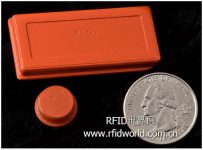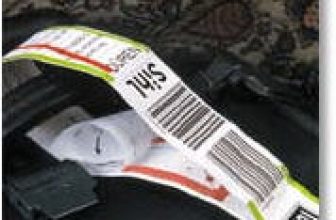
Airbus officially signs the purchase contract for high-memory passive tags
[ad_1]
Airbus signed a seven-year contract with a high-memory, passive EPC Gen 2 RFID tag manufacturer. Airbus plans to use RFID to track thousands of new pressurized and non-pressurized parts of the new A350 ultra-wide aircraft (XWB), and the contract is part of it. The A350 is expected to be officially put into use in 2013.
Airbus expects that the purchase of tags with up to 8 kilobytes of memory will be used to track aircraft parts and data storage, such as the original production and maintenance information of the parts. Overall, Airbus plans to label approximately 3,000 components for each A350 aircraft. About half of them require high-memory tags that can store relevant information.

Two high-memory passive tags flytag
High memory tags-mainly installed on repairable parts-help Airbus and parts repair companies improve processes such as repairs and warehouse logistics.
In mid-2009, Airbus issued RFID application requirements to the company’s repairable parts suppliers, but at that time it did not announce which company would become the main tag supplier. Last Tuesday, French RFID solution provider MAINtag and American chip manufacturer Tego announced that they were selected by Airbus as the label supplier.
“The Airbus case is just the beginning of high-memory, passive RFID tag applications,” said Holger Kisker, a senior analyst at Forrester Research in Germany. “We will see smart label solutions used in asset management and other business areas in many industries.”
MAINtag and Tego reached a cooperation in the summer of 2009 to jointly bid to become a high-memory RFID tag provider for Airbus and its suppliers. MAINtag designs and manufactures tags. Tego provides tags with high-memory RFID chips. The two also reached a marketing agreement in which Tego helped MAINtag obtain US business, and MAINtag returned to help Tego’s business in France.
Airbus purchases tags from MAINtag and recommends them to its suppliers. The company plans to use the purchased tags on the A350 XWB aircraft parts it produces in-house. Since most of the aircraft parts are provided by external suppliers, Airbus recommends that suppliers adopt MAINtag so that all parts and components use the same standard technology, and suppliers can also benefit from a standard business environment.
“Suppliers have complete freedom to choose their own suppliers,” said Martin Fendt, an Airbus spokesperson. “We only provide recommendations for RFID applications on a supply basis, which can help suppliers simplify the procurement and quality inspection process”
Airbus and its suppliers will initially use 4,000-word tags, and by the end of this year they will use more memory-8 kilobytes-tags, according to Carlo Nizam, Airbus’s value chain visibility director, and Tego president Tim Butler. Airbus will receive the final version of the 4 kilobyte memory tag at the end of March, and Nizam said it will conduct related tests before sending it to suppliers in June.
By the end of this year, Nizam and Butler stated that through software modifications, suppliers can upgrade 4 kilobyte tags to 8 kilobyte tags for free.
The price of MAINtag and Tego tags is set at $15 each, depending on the quantity. According to Tego, there are approximately 500 orders for Airbus A350 aircraft. The two companies will work directly with Airbus and 50-60 component suppliers to supply labels.
MAINtag and Tego stated that they have also developed a tag with up to 32 kilobytes of memory, which is now being used in other countries in cooperation with customers. In fact, Airbus also tested a prototype 32 kilobyte tag earlier last year. The test results made Airbus more confident in this technology and confirmed the application cases of high-memory tags.
According to Airbus and MAINtag, Airbus did not use the Tego 32-kilobyte chip because of the price issue. In addition, the initial requirement for tag memory by aircraft manufacturers was only 4 kilobytes. Over time, Airbus will gradually purchase tags with more than 8 kilobytes of memory.
“4 kilobytes is a good start,” said Paul Antoine Calandreau, head of the Airbus value chain visualization project. “8 kilobytes helps us to be at the forefront of the future.”
Airbus’s contract stipulates that MAINtag will provide two designs of FLYtag tags (used on metal parts). One is designed for smaller parts and has a circular shape with a diameter of 0.5 inches, and the other is rectangular with a width of 0.75 inches and a length of 1.75 inches. The reading distance of tags varies with the environment and its shape, with smaller tags having a shorter reading distance, according to Bruno Lo-Re, president of MAINtag. However, both tags exceed the performance requirements set by the Airbus contract.
“This is a historic application for the RFID industry because it is the first global open-loop application that uses high-priced passive tags,” Lo-Re said.
[ad_2]




